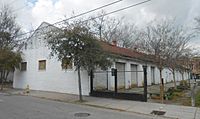Charleston sanitation strike facts for kids
Quick facts for kids Charleston sanitation strike |
|||
|---|---|---|---|
| Part of the Civil Rights Movement in South Carolina |
|||
 |
|||
| Date | August 15, 1969 – October 29, 1969 | ||
| Location | |||
| Caused by |
|
||
| Resulted in |
|
||
| Parties to the civil conflict | |||
|
|||
The Charleston sanitation strike was a protest that lasted over two months in Charleston, South Carolina. It happened because many African-American sanitation workers were unhappy with their low pay and difficult working conditions. This strike was an important part of the Civil Rights Movement in South Carolina.
Before this strike, Charleston had already seen other protests. From March to June 1969, the 1969 Charleston hospital strike brought important leaders of the Civil Rights Movement to the city. These events showed that people were ready to stand up for their rights.
Contents
Why Did the Workers Strike?
On August 15, 1969, the Black sanitation workers in Charleston decided to go on strike. Some other city workers joined them too. The mayor, Mr. Gaillard, was planning to change the workweek from six days to five. He thought the strike was being pushed by outside groups who wanted to take credit for this change.
The mayor was strongly against workers forming unions. By August 16, the city was already looking for new workers to replace those on strike. Garbage collection continued, but it was much less than usual. White workers who were not striking and some prison workers helped collect trash.
The city moved garbage trucks to a safe place and had police officers guard the main facility. Union organizers encouraged workers not to go to work. A union representative explained what the workers wanted. They asked for better salaries, work uniforms, and improved health insurance. They hoped to get $3 per hour, up from $1.88 per hour.
Protests and Talks Begin
After one week, the protests grew bigger. Workers picketed at a fire station because firemen were helping collect garbage during the strike. The city then announced pay raises for workers earning less than $5000 a year. They also offered rain gear or uniforms for sanitation workers. But the garbage workers still wanted more. They wanted an immediate pay raise and for their union to be officially recognized.
As the strike continued, the governor, Mr. McNair, sent 20 state police officers to protect the workers who were still on the job. He also said he was thinking about a state law to stop public employees from striking. Charleston had already seen three other work stoppages that year, including a strike by port workers and two nurses' strikes. Later in 1969, new anti-strike laws were discussed because of these events.
Tensions grew over several weeks. Important groups like the United Auto Workers (UAW), the Southern Christian Leadership Conference (SCLC), and the Concerned Clergy Committee supported the striking workers.
On September 20, 1969, many people marched from Sumter Street to City Hall to show their support. At the end of September, the city told the striking workers they would lose their health insurance on October 1. However, the Union of City Employees offered to pay for the strikers' insurance so they wouldn't lose their coverage.
How the Strike Ended
In October, James Clyburn, who is now a Congressman, helped with talks between the city and the workers. He represented a group of Black leaders and organizations. He was worried about the talks because earlier that year, the Medical University and County Hospital had not fully followed the agreement from the nurses' strike.
By this point, the main disagreements were about three things:
- A higher salary for the workers.
- The ability for the union to automatically collect dues from workers' paychecks.
- A fair person or group to handle disagreements instead of the mayor.
The strike finally ended on October 29, 1969. The city agreed to pay workers an extra $2 per week. All the striking workers were hired back, and they kept their seniority rights. A new process was also created for handling worker complaints that did not involve the mayor. This was a big win for the workers and their fight for fair treatment.
See also
Images for kids
 | Chris Smalls |
 | Fred Hampton |
 | Ralph Abernathy |


